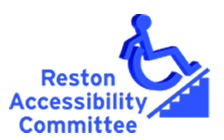Volunteers advocate for better access for the disabled; Reston group helps businesses change practices
By Gregg MacDonald, Washington Post Staff Writer
Jan 21, 2010
Start Page: T.14 Section: 6 Text Word Count: 560
Ken Fredgren is a living testament that one person can make a difference.
Fredgren, 70, developed polio in 1959 and now suffers from post-polio-syndrome, which severely limits the use of his legs. He uses a three-wheel mobility scooter to get around.
Fredgren and his wife lived in Arlington County, where they ran the Arlington Center for Dance school before selling it in 2002, for 34 years. The couple moved to a one-level house in Reston in 2003. “Our old home in Arlington had five steps in front and seven in back, and it just became too difficult for me,” he said.
Soon after moving to Reston, Fredgren said he became increasingly disappointed with the lack of handicapped access at restaurants and stores.
“It was frustrating,” he said. “There was obviously a need for more ramps and adequately accessible parking spots.”
At first, Fredgren suffered his frustration in silence, avoiding areas that he could not gain access to in his motorized scooter. “I have always been an activist, but I didn’t know of any avenue available for me to take action,” he said.
He discovered the nonprofit Reston Citizens Association and befriended its president, Marion Stillson, who uses a wheelchair. “I had been a sole advocate for 30 years in Reston in terms of accessibility for the disabled,” Stillson said. “When I met Ken, I knew he would be a great leader on this issue.”
In late 2007, Stillson and Fredgren decided to form a volunteer committee to address mobile impairment and accessibility issues within Reston. Fredgren became the group’s chairman. In January 2008, the seven-member, all-volunteer Reston Accessibility Committee held its first meeting. Its starting budget was $190, Fredgren said.
By March 2008, the group had created a brochure highlighting basic tenets of the federal Americans with Disabilities Act, which requires that businesses provide basic accessibility for disabled persons. The group offered to work with business owners and managers on easy and inexpensive ADA compliance solutions.
“We then just went out and distributed our brochures, evaluated accessibility — or lack thereof — at several business parks and retail shopping centers throughout Reston, and contacted property managers and owners when we felt there were addressable issues,” Fredgren said. “We were initially met with resistance in many cases, but slowly and surely, we began to make some progress.”
Fredgren said his group has had several recent successes, including getting one Reston office building to make its entry ramp less steep and persuading owners of a shopping center to install a curb ramp linking two existing handicapped parking spaces to a local restaurant.
“That is one of our most convincing arguments,” Fredgren said. “We are potential customers, and we just need an accommodation to be able to patronize your place of business. In addition to that, the fact is that you really don’t want to get sued by the Civil Rights Division of the Department of Justice.”
Fredgren said some property managers and owners willingly comply when the problem is made clear to them.
Kristina Petersen, senior property manager for Lincoln Property, which manages the Hunters Woods Village Center, added two handicapped spaces with access aisles, a curb ramp and several crosswalks within the shopping center.
Next week at its meeting, the Fairfax County Board of Supervisors will recognize Fredgren and the Reston Accessibility Committee for their accomplishments.
Credit: Fairfax County Times
Reproduced with permission of the copyright owner. Further reproduction or distribution is prohibited without permission.
